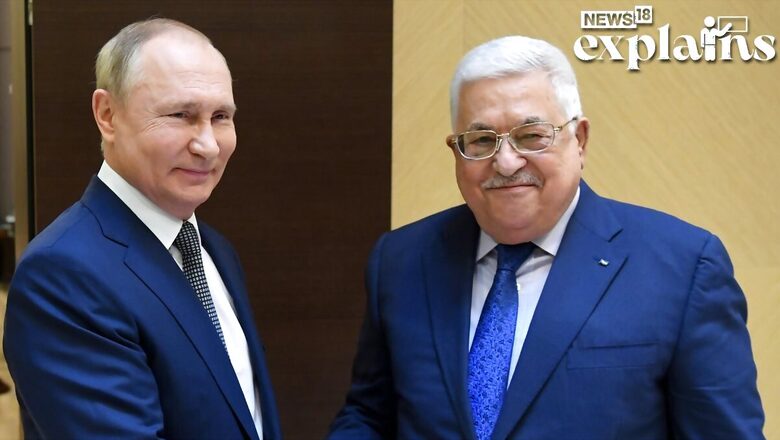
views
Russian President Vladimir Putin has said that Israel risked waging an “unacceptable” siege in Gaza comparable to the Nazi blockade of Leningrad during World War II.
“Various scenarios are emerging, including the possibility of military and non-military measures being taken against the Gaza Strip comparable to the siege of Leningrad during World War II,” Putin told journalists on a visit to Kyrgyzstan.
“We understand what that entails. In my opinion, this is unacceptable. More than two million people live there,” he added. Putin renewed his call for negotiations on Friday, and offered Moscow as a potential mediator.
Earlier, Putin said the conflict was rooted in the inability to create a sovereign Palestinian state in line with UN resolutions that he called a “gross injustice.”
What is Siege of Leningrad?
The siege of Leningrad (St Petersburg) was one of the deadliest sieges in history where Germany besieged the city for over two years during the Second World War, during which the city suffered an estimated one million civilian deaths.
Leningrad, which lies at the mouth of the river Neva had around 2.5 million inhabitants at the beginning of the blockade. It was a major target when Germany launched its invasion of the Soviet Union on June 22, 1941. The German army advanced rapidly and by September 1941 surrounded the Soviet Union’s second city cutting of roads and railways, depriving the city of food, fresh water, and electricity.
Leningrad was subjected constant air raids and shelling and the siege lasted for almost two and a half years during which over one million civilians died, mostly of starvation.
Vladimir Putin’s Personal Connection
Putin also invoked Leningrad also because of his own personal connection to the siege. While the Russian President was born six years after the siege of Leningrad was lifted, he lost his brother during the siege.
“My brother, whom I have never seen and did not know, was buried here, I don’t even know where exactly,” Putin said during an annual wreath laying ceremony.
Viktor Putin would have been only 2-years-old when he passed away in 1942, most likely due to the cold and starvation.
What is Russia Saying About the War?
President Vladimir Putin has urged the Israeli government and Hamas not to target civilians and emphasized that every effort must be made to quickly end the war, saying an escalation would raise grave risks.
He also said that Israel’s settlement policies have exacerbated the situation. He urged the Israeli government and Hamas not to target civilians and emphasized that every effort must be made to quickly end the war, saying an escalation would raise grave risks.
While jockeying as a potential peacemaker, Moscow also hopes the fighting will distract Washington and its allies from the war in Ukraine and eventually erode Western support for Kyiv.
How Has Moscow’s Mideast Policy Evolved?
During the Cold War, Russia strongly backed the Palestinians and other allies in the Arab world against Israel, giving them military and political support.
The Soviet Union broke diplomatic ties with Israel after the 1967 Arab-Israeli war. Moscow’s policies began to shift as Soviet leader Mikhail Gorbachev reshaped foreign policy and relations with Israel were restored before the 1991 collapse of the USSR.
After Putin took power, he sought to revive old Middle Eastern alliances while maintaining warm ties with Israel. Russia joined a quartet of Middle East peacemakers along with the United States, the European Union and the United Nations, but it played a minor role in efforts, compared with the U.S.
In 2015, Moscow sent its warplanes and troops to its old ally, Syria, teaming with Iran to shore up President Bashar Assad’s regime amid a civil war. The Russian intervention allowed Assad to reclaim control over most of the country and helped expand Moscow’s clout in the Middle East.
Russia’s Relations with Israel?
Russia and Israel have steadily expanded trade and other contacts and strengthened their security ties after the Soviet breakup. More than 1 million people from Russia have moved to Israel, a development that described as a major factor in cementing ties.
Moscow’s relations with Israel remained strong amid Russia’s operations in Syria even as the Israeli military frequently attacked Iranian forces that had teamed up with Russian troops in the country.
Putin’s invasion of Ukraine has posed a major test for Russian-Israeli relations. Israeli authorities have walked a fine line, voicing support for Kyiv but refusing to provide it with weapons. The Russian president also has praised Israeli mediation efforts early in the fighting.
Israeli Prime Minister Benjamin Netanyahu explained his government’s reluctance to send military equipment to Kyiv by emphasizing the need to maintain security contacts with Moscow in Syria and voicing concern the weapons supplied to Ukraine could end up in Iranian hands.
Russia’s Relations with Palestine
During the Cold War, Russia was backing Palestine, offering them political, economic and military support. The Soviet Union provided generous subsidies, helped train Palestinian forces and provided them with weapons.
However, the ties weakened after the Soviet Union’s collapse as the Kremlin focused on domestic challenges.
Moscow has repeatedly hosted Palestinian leader Mahmoud Abbas and has also reached out to Hamas. Several Hamas leaders have visited Moscow, including Ismail Haniyeh, who held talks with Russian Foreign Minister Sergey Lavrov in September 2022.


















Comments
0 comment